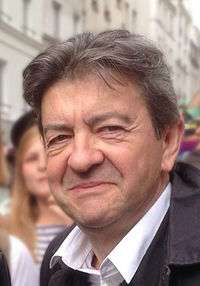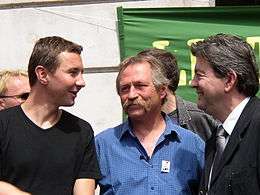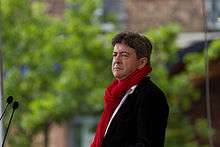Jean-Luc Mélenchon
| Jean-Luc Mélenchon MEP | |
|---|---|
 | |
| Minister of Vocational Education | |
|
In office 27 March 2000 – 6 May 2002 | |
| President | Jacques Chirac |
| Prime Minister | Lionel Jospin |
| Preceded by | Claude Allègre |
| Succeeded by | Luc Ferry |
| Member of the European Parliament from France | |
|
Assumed office 14 July 2009 | |
| Senator from Essonne | |
|
In office 2 October 1986 – 24 September 1995 | |
|
In office 1 October 2004 – 7 January 2010 | |
| Succeeded by | Marie-Agnès Labarre |
| Personal details | |
| Born |
Jean-Luc Antoine Pierre Mélenchon 19 August 1951 Tangier, Tangier International Zone, today Morocco |
| Nationality | France |
| Political party |
Internationalist Communist Organisation (Before 1977) Socialist Party (1977–2008) Left Party (2008–present) |
| Alma mater | University of Franche-Comté |
| Website | http://www.jean-luc-melenchon.fr/, http://europe.jean-luc-melenchon.fr/ |
Jean-Luc Mélenchon (French pronunciation: [ʒɑ̃.lyk me.lɑ̃.ʃɔ̃], born 19 August 1951 in Tangier, Morocco, is a French politician.
Member of the Socialist Party since 1976, he is successively elected municipal councilor of Massy (1983), general councilor of the Essonne departement (1985), senator of the same departement (1986, reelected in 1995 and 2004). He also served as Minister delegate of Vocational Education between 2000 and 2002, next to the Ministry of National Education, Jack Lang, in the cohabitation government of Lionel Jospin.
He is part of the left wing of the Socialist Party until the Reims Congress of 2008, at the outcome of which he left that party to found the Left Party with deputy Marc Dolez.[1][2] He is the president, and then co-president of it, along with Martine Billard, until August 2014.[3]
As leader of the Left Party, he joined the electoral coalition of the Left Front before the 2009 European elections and was elected member of the European Parliament in the South-West constituency (reelected in 2014). During the protest movement against the pension reform of 2010 his public stature grew thanks to his many public and television appearances. He was also the candidate of that coalition in the 2012 presidential election, at the outcome of which he came in fourth, receiving 11.1% of the votes. He is candidate to the 2017 presidential election "outside the frame of political parties", and found the movement "Unsubmissive France" in February 2016.
Early life
Born in Tangier (Tangier International Zone),[4] he was educated at the Lycée Pierre-Corneille in Rouen (Normandy).[5]
His father was a postmaster and his Spanish-born mother was a primary school teacher. He grew up in Morocco, until his family moved to France in 1962.[4]
With a degree in philosophy from the University of Franche-Comté in Besançon, and having gained the CAPES (a professional teaching qualification), he became a teacher before entering politics.[4][5]
Political career
2012 French presidential candidate
He was the candidate representing the Left Front (Communist Party of France, Left Party, Unitarian Left) in the 2012 French presidential election.[6][7] He took fourth place and achieved 11.10% of the vote, trailing behind François Hollande, Nicolas Sarkozy, and Marine Le Pen (and their respective parties, the Socialist Party, Union for a Popular Movement, and National Front). In comparison, the winner François Hollande received 28.63% of the vote.[8]
2012 French legislative candidate
Mélenchon represented the Left Front in the Pas-de-Calais' 11th constituency, to confront his rival Marine Le Pen, where she had over 31% in the presidential election.[9] He received third place with 21.46% of the vote, narrowly edged out for second by Socialist Party member Phillip Kemel. Mélenchon decided not to stand in the second round of the election after this result.[10]
Political positions
Jean-Luc Mélenchon is a socialist republican and historical materialist, inspired primarily by Jean Jaurès (the founder of French republican socialism) and employing Marxian analysis to understand the crisis of market capitalism.

Previously a defender of European federalism, Mélenchon has renounced that political commitment, declaring that "the European Union is no longer a solution but a problem, because economic liberalism has totally corrupted the institution and makes it impossible to achieve the democratic change needed in the EU, all power belonging to technocrats with no popular legitimacy". For this reason, he is for the establishment of a different, democratic, united, and cooperative Europe, and is opposed to the Lisbon Treaty as well as questioning the independence of the European Central Bank.

Based on his experiences in South America, Mélenchon favors "The Citizens' Revolution" (révolution citoyenne), drawing additionally on ideas stemming from the French Revolution and the Paris Commune, and a new strategy that respects the democratic process while seeking to win elections in order to change the constitution. This "citizens' revolution" should lead to a reversal of the current division of wealth held by capital, represented by shareholders, and the working class (understood in the broad sense of anyone who actually works to earn money directly). Additional goals include a new constitution that will initiate a 6th French Republic in which the president will have less power and Parliament more, increase wages, a public bank created by nationalizing the private banks, democratization through the establishment of new rights for employees allowing them to develop cooperatives, the nationalization of large corporations, environmental planning, an exit from NATO, an end to the war in Afghanistan, and peace in the Middle East through the creation of a Palestinian state. Jean‑Luc Mélenchon also insists on the importance of "popular involvement" through public referendums on any essential subject. He expressed his support for the secularization of the French society and for the legality of same-sex marriage and euthanasia.
Political career
Governmental functions[4]
Minister of Vocational Education, 2000–2002.
Electoral mandates
European Parliament
Member of European Parliament since 2009.
Senate of France
Senator of Essonne, 1986–2000 (became minister in 2000), 2004–2010 (resignation, elected in European Parliament in 2009). Elected in 1986, reelected in 1995, 2004. (At the age of 35, he was the youngest member of the Senate when he was elected to it in 1986.)
General Council
Vice-president of the General Council of Essonne, 1998–2001.
General councillor of Essonne, 1985–1992, 1998–2004. Reelected in 1998.
Municipal Council
Deputy-mayor of Massy, Essonne, 1983–1995.
Municipal councillor of Massy, Essonne, 1983–2001. Reelected in 1989, 1995.
Political function
Co-President of the Left Party, 2008-2014.
References
- ↑ Statement by Jean‑Luc Mélenchon made after he left the Socialist Party (French)
- ↑ Speech by Jean-Luc Mélenchon at the creation congress of the Left Party (French)
- ↑ Sulzer, Alexandre (24 August 2014). "Quelle mouche a piqué Jean‑Luc Mélenchon?". L’Express (in French). Paris. ISSN 0245-9949. Archived from the original on 29 October 2015.
Décidément, Jean‑Luc Mélenchon aime les subtilités. Celui dont on connaissait le ‘vague à l’âme’ depuis une interview pour le site Hexagones.fr fin juillet a confirmé vendredi qu’il quittait la co‑présidence du Parti de Gauche (PG) avec Martine Billard.
- 1 2 3 4 "Le CV de Jean‑Luc Mélenchon", Europe 1, 5 March 2012
- 1 2 "Lycée Pierre Corneille de Rouen: History". lgcorneille-lyc.spip.ac-rouen.fr. 19 April 1944. Retrieved 2012-04-14.
- ↑ Candidates officially endorsed by Conseil constitutionnel for the 2012 presidential elections, La Tribune. Retrieved 19 March 2012.
- ↑ De la Baume, Maïa; Erlanger, Steven (10 April 2012). "In French Vote, Sound and Fury From the Left". New York Times (New York ed.). p. A6. ISSN 0362-4331. Archived from the original on 29 September 2015.
- ↑ "Elections Législatives – Results". France 24.
- ↑ "Election présidentielle 2012 – Résultats du 1er tour par circonscription" (in French). Politiquemania.
- ↑ "French far‑left leader Jean‑Luc Melenchon admits defeat by far‑right's Le Pen". The Daily Telegraph. Sydney. AFP. 11 June 2012. Archived from the original on 16 November 2015.
Mr Melenchon said he would not stand in next Sunday’s second round after coming third, instead leaving his Socialist rival to battle Ms Le Pen. . . . Mr Melenchon won 11 per cent of votes in the April‑May presidential vote that was won by Socialist Francois Hollande, while Ms Le Pen won almost 18 per cent of votes.
External links
| Wikimedia Commons has media related to Jean-Luc Mélenchon. |